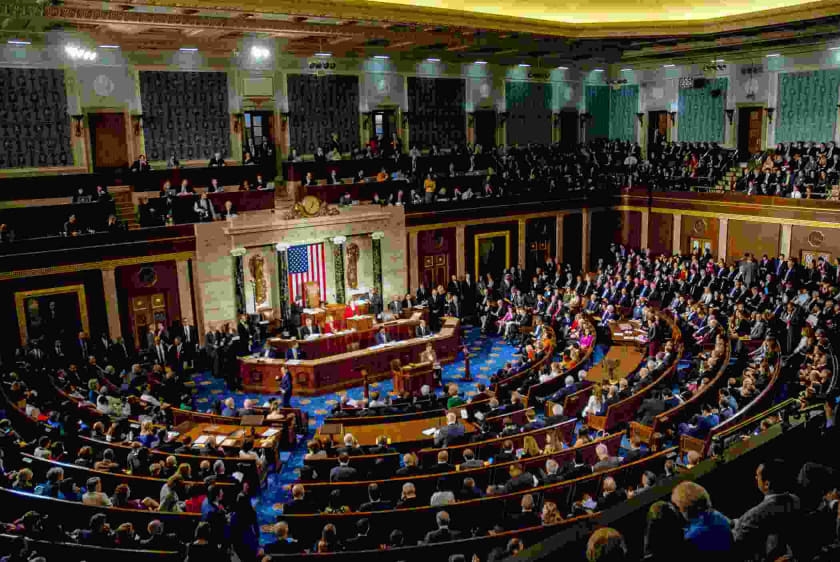US Senate passes bill to ban all products from China's Xinjiang



The US Senate has passed a bill, banning imports from China's Xinjiang region, in response to the alleged abuse and forced labour of the Muslim Uyghur minority group. “No American corporation should profit from these abuses” was the sentiment behind this decision.

The Xinjiang region of China has been the center of controversy for a while, owing to the allegations of ‘crime against humanity’. Allegedly, Uyghur Muslims in the region are subjected to detention, forced labour, forced sterilization, and various other forms of abuse. China has largely denied such accusations by projecting the detention camps as ‘re-education camps’ for the Muslim Uyghur community. Amnesty and Human Rights Watch, however, have brought to light a different reality through the reports they published on the crimes committed by the country. China’s abusive treatment of the ethnic group has been stirring international debates since 2018, and recently, the UN has also cited coercion and detention of over 1 million Uyghurs. The European Union (EU), Canada, and the UK have all declared discontent and sanctions against China while America has been the loudest in condemning China’s treatment of the Uyghurs.

The latest ban by the US Senate comes as a strategic move to put pressure on Beijing on issues regarding major human rights abuse. They had already banned imports of Xinjiang cotton and tomatoes earlier followed by a ban on the imports of solar panel material.
The bill was passed by unanimous consent on Wednesday. According to the bill, the importers of the products will have to prove that the goods were not manufactured using forced labour. Reports suggest that the Uyghur Forced Labor Prevention Act needs the US Department of Homeland Security to prepare a list of entities aiding and abetting the Chinese government to suppress Uyghurs and other minority groups. The bill advocates a case of ‘rebuttal presumption’ where all the products made in Xinjiang are assumed to be the results of forced labour, and hence, banned under the Tariff Act of 1930.
The bill is yet to mandatorily pass the House of Representatives before it can be sent to the White House for the President’s final approval. Reportedly, the latest Uyghur Forced Labor Prevention Act, if passed, will be potent of visa and asset-blocking sanctions if found connected to Xinjiang.
How Can the Ban Affect US-Based Clothing Brands?

The US has imposed a ban on 87% of China’s cotton, which accounts for one-fifth of the global supply. The overnight ban, which has crippled the supply chain for thousands of fashion brands, is a move to remember because it unequivocally prioritizes ethics over profits. Notably, supply chains across the world are reeling from the consequences of the ban because it reinforces that any product made either in part or whole from Xinjiang cotton is to be prohibited. Not only the Chinese manufacturers but also manufacturers from Bangladesh and Vietnam source their raw materials (including cotton) from China, but they can no longer continue to do so while serving American brands
The question that’s hanging on everyone’s lips at the moment is, how can the fractured supply chain be fixed? How can fashion brands overcome this hurdle without falling on their faces? One solution (and perhaps the only viable one at this point) is to turn to the largest producer of cotton in the world - India. Infact, for those interested in the silver lining, this comes as a timely opportunity - the demand for organic cotton is radically increasing in the US with growing environmental consciousness. India happens to be the world’s largest producer of organic cotton (in addition to traditional cotton), single handedly producing more than 51% of the global supply of the organic variant.
With more than adequate supply of cotton and a robust manufacturing industry in place, India is all set to cushion fashion brands against the impact of the ban. Brands that have their manufacturing bases in Vietnam and Bangladesh can also have their raw materials sourced from India. Visibility within the supply chain has emerged as another major concern, with the Senate placing the burden of proof on importers about the products’ origin. This is where tech platforms like Fashinza can step in. As a general practice, Fashinza offers end to end visibility to partner brands, enabling them to track every stage of the production process with visual footage from the factory floor. The entire supply chain becomes 100% transparent in the process, with any complications regarding origin issues being resolved.
It is a pivotal moment in the history of the garment industry, with one of the largest players in the manufacturing sector being outcast from the US market. It remains to be seen how China and the brands themselves surf this wave of change. The shift wouldn’t be too difficult for the brands that are agile and flexible in their operations, because alternatives are already within an arm’s reach. At the end of the day, it is a change that intends to lead humanity towards the correct moral direction and it deserves the cooperation of every upstanding brand.



















